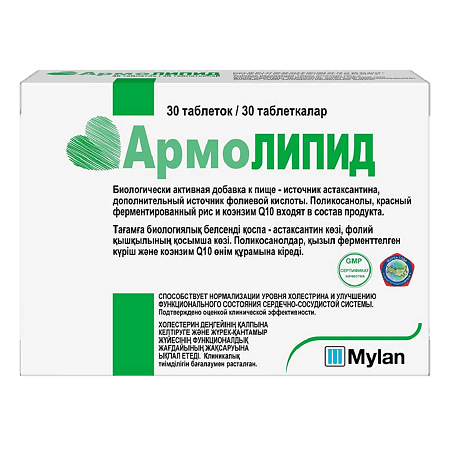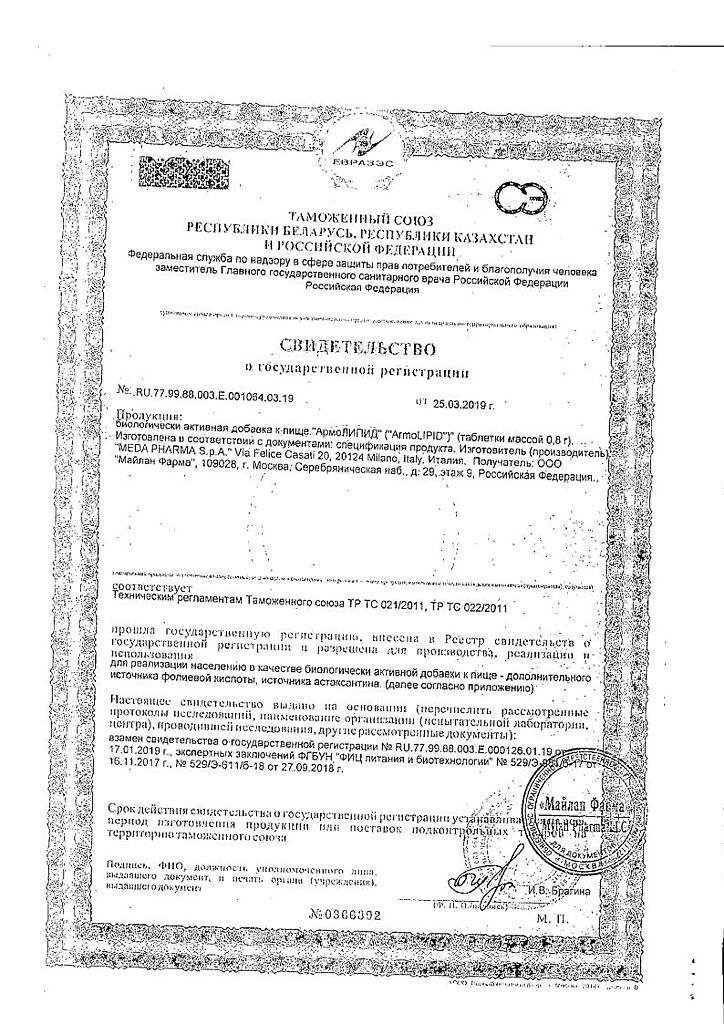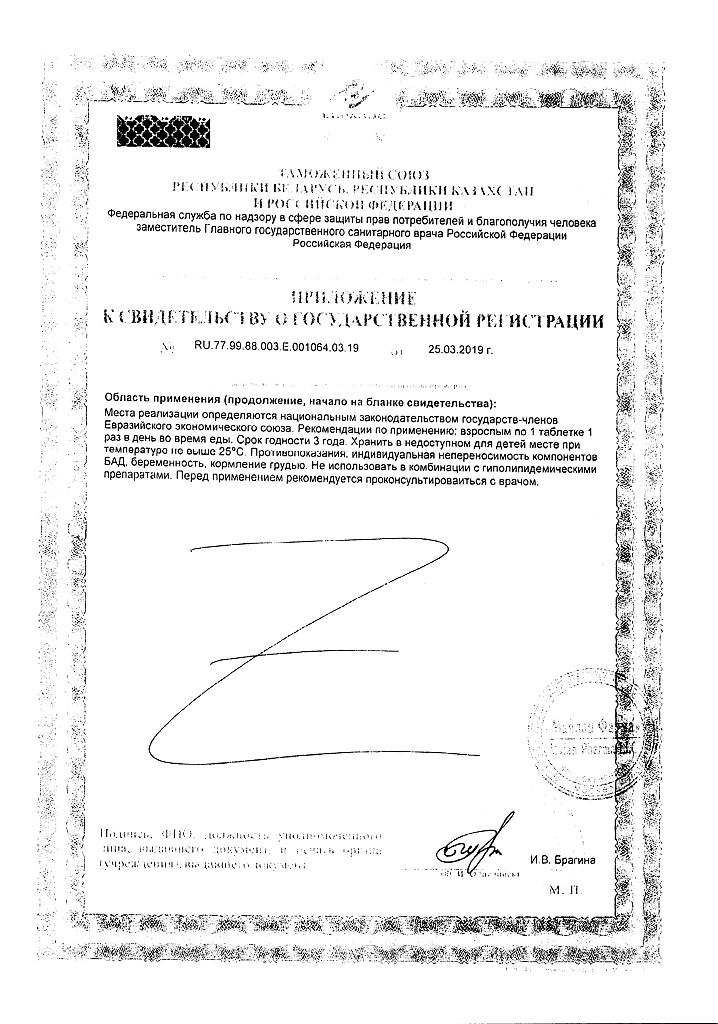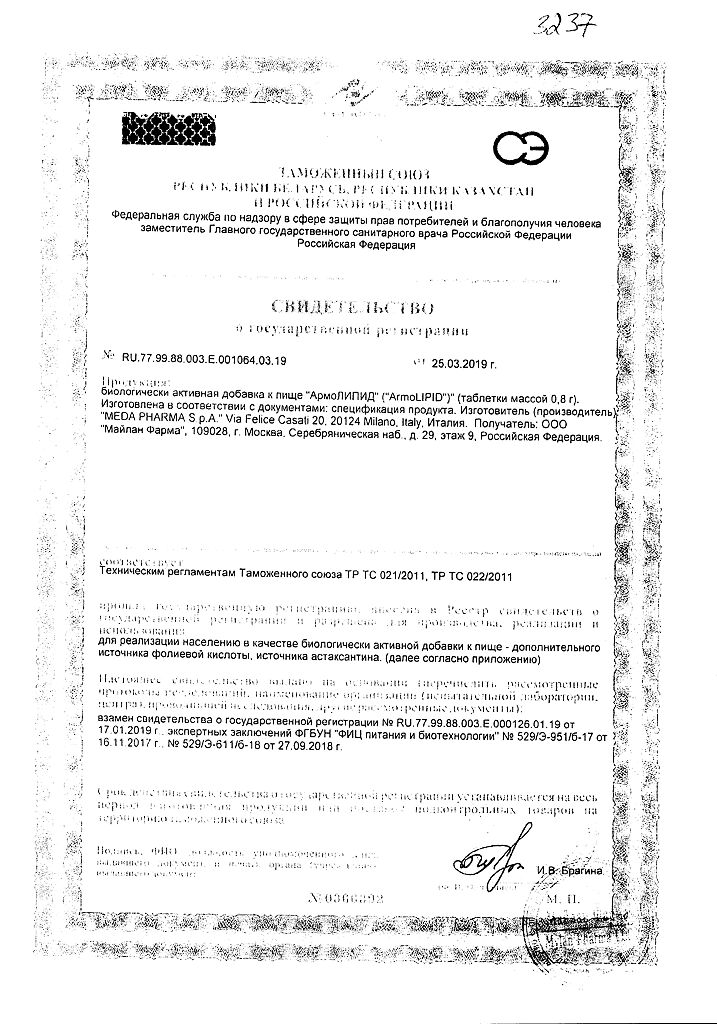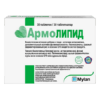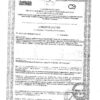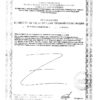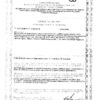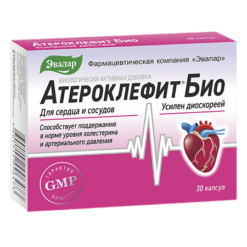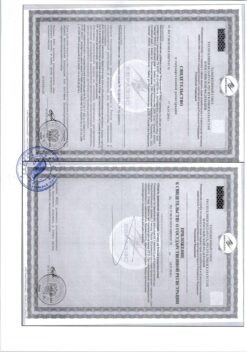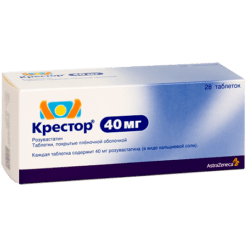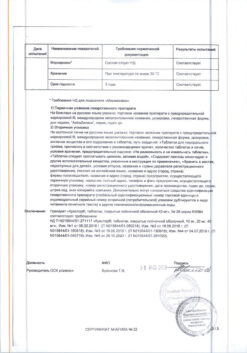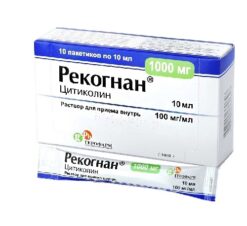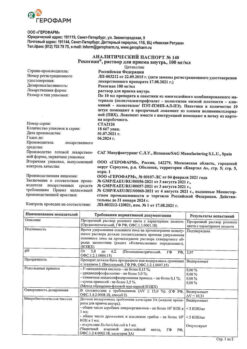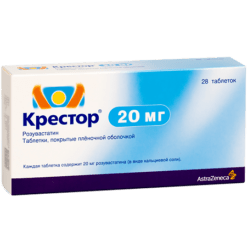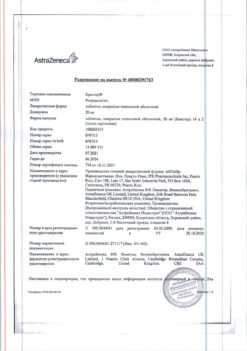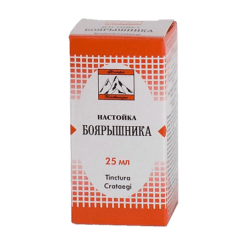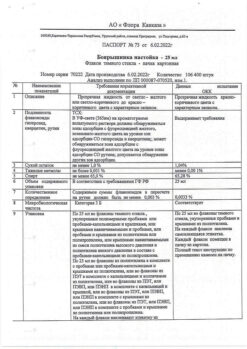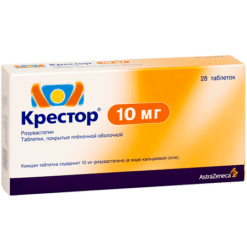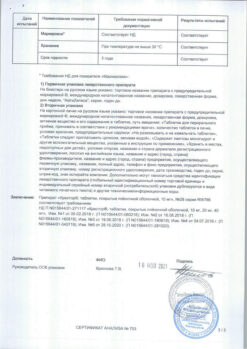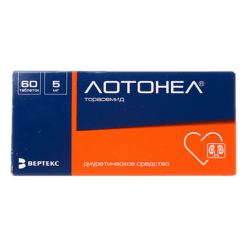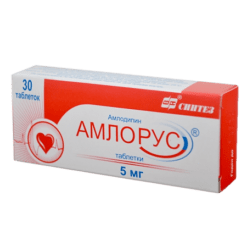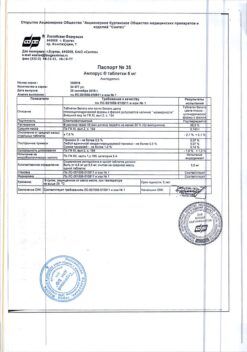No products in the cart.
Armolipid, tablets, 30 pcs.
€26.63 €22.19
Description
Cardiovascular risk
Cardiovascular and cerebrovascular diseases are the leading cause of death and disability worldwide. Hypercholesterolemia is an independent risk factor for cardiovascular disease. Recent scientific studies have shown that:
– Any level of low-density lipoprotein cholesterol (LDL) above the recommended value is associated with an increased risk of cardiovascular events.
– Reducing LDL cholesterol to optimal concentrations reduces this risk
– An independent risk factor for cardiovascular events is high levels of homocysteine in the blood, a condition that can develop in cases of folic acid deficiency
– Oxidative stress, caused by an increased amount of free radicals in the body due to improper diet, smoking, intense physical activity and disease, has a pro-atherogenic effect and increases the risk of adverse cardiovascular disease.
An important cause of atherosclerosis is an excessive or unbalanced diet, which leads to high blood cholesterol levels, changes the lipid profile and deficiency of vital nutritional factors. Lifestyle changes (exercise, healthy eating and smoking cessation) are the cornerstone of cardiovascular disease prevention.
To improve the plasma lipid profile in patients with dyslipidemia, current guidelines recommend the use of supplements and nutraceuticals (such as red yeast rice and polycosanol), which can be used as an alternative or in addition to hypolipidemic medications in certain conditions.
Red yeast rice
Red fermented (yeast) rice is a fermentation product of the fungus Monascus purpureus and contains monacolin K, which can modulate blood lipid levels. In Armolipid red yeast rice is obtained under standard conditions with a specific strain of Monascus purpureus, chosen for its optimal yield of monacolin K (the main active ingredient of red yeast rice), with a well-defined and assured titer assay. Experimental and clinical studies have shown that red yeast rice lowers total cholesterol and LDL cholesterol.
Policosanols
Policosanols are a mixture of natural (natural) fatty alcohols found in the wax matrix of sugarcane (Saccharum officinarum), rice bran (Oryza sativa) and beeswax (Apis mellifera). The policosanols in Armolipid are derived from sugar cane. Polycosanols increase the effectiveness of blood cholesterol control.
Folic Acid
Folic acid is essential for many biochemical functions in the human body, including nucleotide biosynthesis and the re-methylation of homocysteine to methionine. Folic acid deficiency is associated with high levels of homocysteine in the blood, a condition known as hyperhomocysteinemia, and is recognized as an independent risk factor for cardiovascular disease. The human body cannot synthesize folic acid. Modern diets are often associated with folic acid deficiency, which is now the most common form of hypovitaminosis. The daily requirement for folic acid is 0.2 mg. Armolipid contains a daily allowance of folic acid.
Astaxanthin
Astaxanthin is one of the most powerful antioxidants found in nature. Its antioxidant activity is 100-500 times greater than that of vitamin E, 6 times greater than beta-carotene and 4 times greater than lutein. Because of its antioxidant properties, astaxanthin inhibits peroxidation and prevents the formation of proatherogenic particles. Astaxanthin stabilizes the cell membrane, protecting phospholipids from damage caused by intracellular and extracellular reactive oxygen species (ROS). This effect is necessary to prevent endothelial dysfunction, a condition that plays a key role in the development of atherosclerosis.
Coenzyme Q10
Coenzyme Q10 (CoQ10) is synthesized in the human body. It is an important cofactor necessary for the synthesis of ATP, which is necessary for the functioning of all cells, tissues and organs, especially those with high energy requirements.
Indications
Indications
Cardiovascular and cerebrovascular diseases are the leading cause of death and disability worldwide. Hypercholesterolemia is an independent risk factor for cardiovascular disease. Recent scientific research has shown that:
– Any low-density lipoprotein (LDL) cholesterol level above the recommended value is associated with an increased risk of cardiovascular events.
Reducing LDL cholesterol to optimal concentrations reduces this risk
– An independent risk factor for cardiovascular disease is high levels of homocysteine in the blood, a condition that can develop in case of folic acid deficiency
– Oxidative stress, caused by an increased amount of free radicals in the body due to poor diet, smoking, intense physical activity and disease, has a pro-atherogenic effect, increasing the risk of adverse outcomes of cardiovascular diseases.
An important cause of the development of atherosclerosis is excessive or unbalanced nutrition, which leads to increased cholesterol levels in the blood, changes the lipid profile and determines the deficiency of vital nutritional factors. Lifestyle changes (exercise, healthy eating, and quitting smoking) are the cornerstones of preventing cardiovascular disease.
To improve the plasma lipid profile in patients with dyslipidemia, current guidelines recommend the use of dietary supplements and nutraceuticals (such as red yeast rice and policosanol), which can be used as an alternative to or in addition to lipid-lowering drugs in certain conditions.
Red yeast rice
Red fermented (yeast) rice is a fermentation product of the fungus Monascus purpureus and contains monacolin K, which is capable of modulating blood lipid levels. At ArmoLIPID, red yeast rice is produced under standard conditions with a specific strain of Monascus purpureus selected for optimal yield of monacolin K (the main active ingredient in red yeast rice), with a clearly defined and guaranteed titer analysis. Experimental and clinical studies have shown that red yeast rice reduces total cholesterol and LDL cholesterol.
Policosanols
Policosanols are a mixture of naturally occurring fatty alcohols found in the waxy matrix of sugar cane (Saccharum officinarum), rice bran (Oryza sativa) and beeswax (Apis mellifera). Policosanols contained in ArmoLIPID are obtained from sugar cane. Policosanols increase the effectiveness of blood cholesterol control.
Folic acid
Folic acid is essential for many biochemical functions in the human body, including nucleotide biosynthesis and the remethylation of homocysteine to methionine. Folic acid deficiency is associated with high levels of homocysteine in the blood. a condition known as hyperhomocyesteinemia and is recognized as an independent risk factor for cardiovascular disease. The human body cannot synthesize folic acid. Modern diets are often associated with folic acid deficiency, which is currently the most common form of hypovitaminosis. The daily requirement for folic acid is 0.2 mg. ArmoLIPID contains the daily requirement of folic acid.
Astaxanthin
Astaxanthin is one of the most powerful antioxidants found in nature. Its antioxidant activity is 100-500 times higher than that of vitamin E, 6 times higher than that of beta-carotene, and 4 times higher than that of lutein. Due to its antioxidant properties, astaxanthin inhibits peroxidation and prevents the formation of pro-atherogenic particles. Astaxanthin stabilizes the cell membrane, protecting phospholipids from damage caused by intracellular and extracellular reactive oxygen species (ROS). This effect is necessary to prevent endothelial dysfunction, a condition that plays a key role in the development of atherosclerosis.
Coenzyme Q10
Coenzyme Q10 (CoQ10) is synthesized in the human body. It is an important cofactor required for the synthesis of ATP, which is essential for the functioning of all cells, tissues and organs, especially those with high energy demands.
The results of the evaluation of clinical effectiveness* with ArmoLIPID showed a decrease in total cholesterol and low-density lipoprotein cholesterol, a decrease in homocysteine and a favorable safety profile.
*CICERO AFG et al. Mediterr J Nutrition Metab 2010 3; 3: 239 – 246
*Caputi AP et al. L`internista/medicinaclinica.it 2008; 16:53-60
*Heinz T et al. Nutrition Research 2016 Oct;36(10):1162-1170
Pharmacological effect
Pharmacological effect
Dietary supplement to food – a source of astaxanthin, an additional source of folic acid.
Policosanols, red fermented rice and coenzyme Q10 are included in the product. Cardiovascular risk
Cardiovascular and cerebrovascular diseases are the leading cause of death and disability worldwide. Hypercholesterolemia is an independent risk factor for cardiovascular disease. Recent scientific research has shown that:
• Any low-density lipoprotein (LDL) cholesterol level above the recommended value is associated with an increased risk of cardiovascular events.
• Reducing LDL cholesterol to optimal concentrations reduces this risk
• An independent risk factor for cardiovascular disease is high levels of homocysteine in the blood, a condition that can develop in cases of folic acid deficiency
• Oxidative stress, caused by an increased amount of free radicals in the body due to poor diet, smoking, intense physical activity and disease, has a pro-atherogenic effect, increasing the risk of adverse outcomes of cardiovascular diseases.
An important cause of the development of atherosclerosis is excessive or unbalanced nutrition, which leads to increased cholesterol levels in the blood, changes the lipid profile and determines the deficiency of vital nutritional factors. Lifestyle changes (exercise, healthy eating, and quitting smoking) are the cornerstones of preventing cardiovascular disease.
To improve the plasma lipid profile in patients with dyslipidemia, current guidelines recommend the use of dietary supplements and nutraceuticals (such as red yeast rice and policosanol), which can be used as an alternative to or in addition to lipid-lowering drugs in certain conditions.
Red yeast rice
Red fermented (yeast) rice is a fermentation product of the fungus Monascus purpureus and contains monacolin K, which is capable of modulating blood lipid levels. At ArmoLIPID, red yeast rice is produced under standard conditions with a specific strain of Monascus purpureus selected for optimal yield of monacolin K (the main active ingredient in red yeast rice), with a clearly defined and guaranteed titer analysis. Experimental and clinical studies have shown that red yeast rice reduces total cholesterol and LDL cholesterol.
Policosanols
Policosanols are a mixture of naturally occurring fatty alcohols found in the waxy matrix of sugar cane (Saccharum officinarum), rice bran (Oryza sativa) and beeswax (Apis mellifera). Policosanols contained in ArmoLIPID are obtained from sugar cane. Policosanols increase the effectiveness of blood cholesterol control.
Folic acid
Folic acid is essential for many biochemical functions in the human body, including nucleotide biosynthesis and the remethylation of homocysteine to methionine. Folic acid deficiency is associated with high levels of homocysteine in the blood. a condition known as hyperhomocyesteinemia and is recognized as an independent risk factor for cardiovascular disease. The human body cannot synthesize folic acid. Modern diets are often associated with folic acid deficiency, which is currently the most common form of hypovitaminosis. The daily requirement for folic acid is 0.2 mg. ArmoLIPID contains the daily requirement of folic acid.
Astaxanthin
Astaxanthin is one of the most powerful antioxidants found in nature. Its antioxidant activity is 100-500 times higher than that of vitamin E, 6 times higher than that of beta-carotene, and 4 times higher than that of lutein. Due to its antioxidant properties, astaxanthin inhibits peroxidation and prevents the formation of pro-atherogenic particles. Astaxanthin stabilizes the cell membrane, protecting phospholipids from damage caused by intracellular and extracellular reactive oxygen species (ROS). This effect is necessary to prevent endothelial dysfunction, a condition that plays a key role in the development of atherosclerosis.
Coenzyme Q10
Coenzyme Q10 (CoQ10) is synthesized in the human body. It is an important cofactor required for the synthesis of ATP, which is essential for the functioning of all cells, tissues and organs, especially those with high energy demands.
Special instructions
Special instructions
The product should be used in combination with a varied and balanced diet while maintaining a healthy lifestyle.
It is recommended to consult a doctor before use.
Gluten free
Does not contain GMOs
Composition
Composition
ArmoLIPID combines standardized amounts of natural ingredients in one tablet to control blood lipids (red yeast rice and policosanol), homocysteine levels (folate) and oxidative stress (coenzyme Q10 and astaxanthin).
One tablet of Armolipid contains 10 mg of policosanols; 200 mg Monascus purpureus fermented rice (red fermented rice), equivalent to 3 mg monacolin; 0.2 mg folic acid; 2.0 mg coenzyme Q10 (CoQ10) and 0.5 mg astaxanthin.
Gluten free
Does not contain GMOs
Contraindications
Contraindications
Individual intolerance to components, pregnant and lactating women. Do not use in combination with lipid-lowering drugs.
Taking Armolipid may contribute to the occurrence of gastrointestinal disorders and muscle pain, in particular in people with intolerance to statins. If you experience muscle pain, you should consult your doctor.
Gluten free
Does not contain GMOs
Side Effects
Side Effects
Taking Armolipid may contribute to the occurrence of gastrointestinal disorders and muscle pain, in particular in people intolerant to statins.
If you experience muscle pain, you should consult your doctor.
Overdose
Overdose
Do not exceed the recommended daily dose.
Short product description
Short product description
Dietary supplement Not a medicine.
Before use, it is recommended to consult a doctor (specialist).
Recommendations for use
Recommendations for use
– adults: 1 tablet 1 time per day with meals.
Storage conditions
Storage conditions
Store at a temperature not exceeding 25ºС.
Shelf life
Shelf life
3 years.
Manufacturer
Manufacturer
MEDA Pharma S.p.A., Italy
Additional information
| Shelf life | 3 years. |
|---|---|
| Conditions of storage | Store at a temperature not exceeding 25ºC. |
| Manufacturer | MEDA Pharma S.p.A., Italy |
| Medication form | pills |
| Brand | MEDA Pharma S.p.A. |
Related products
Buy Armolipid, tablets, 30 pcs. with delivery to USA, UK, Europe and over 120 other countries.

